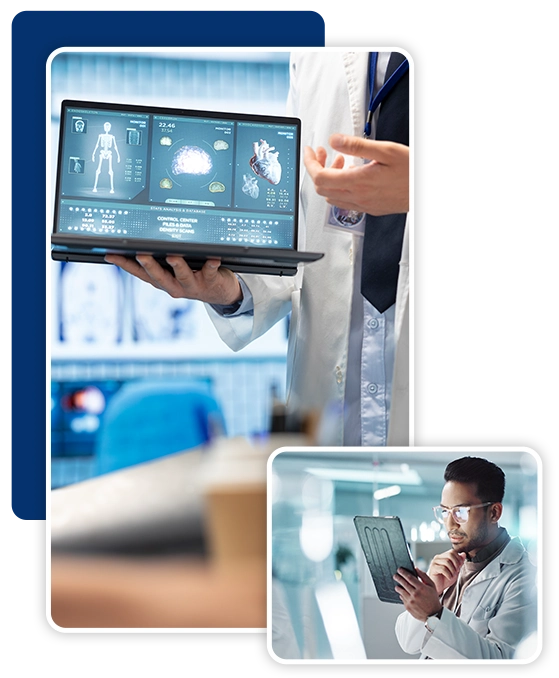Master MDH digital health
With the rapid development of digital technology and its direct impact on the healthcare sector, the Master of Digital Health specialization has become a key element in improving the quality of medical services and ensuring the efficiency of care provided. In response to this need, the Faculty of Health and Environmental Sciences at Vertex University offers the Master of Digital Health program, which aims to provide students with advanced skills in analyzing health data, designing digital systems, and promoting the use of smart technologies in the medical field. The program provides a solid foundation for supporting digital transformation in the health sector, which will have a positive impact on improving the quality of health services and providing a more sophisticated patient experience.
The program focuses on integrating scientific knowledge with practical applications. Students learn how to design innovative technical solutions, analyze health data in advanced ways, and manage medical information systems effectively. The curriculum also focuses on developing their skills in using artificial intelligence in diagnosis and treatment, building digital infrastructure for health institutions, and ensuring the security of medical data in accordance with the latest international standards. The main goal is to prepare specialists who are able to lead digital transformation in the health sector and develop sustainable solutions that enhance the efficiency of health care.
The program includes intensive practical training that enables students to apply what they have learned in real environments through practical projects and specialized training courses that include developing digital health applications, analyzing electronic health records, and experimenting with smart systems in hospitals. The program also includes specialized training in health information security, digital laws, and health data management policies, ensuring that students are provided with the knowledge and experience required for rapid integration into the labor market.
The Master's degree is taught by a group of academics and experts in digital health, ensuring advanced academic content that combines theoretical foundations and practical applications. The program provides an advanced learning environment that includes simulation of smart health systems, innovative research projects to improve the quality of health care, and the use of the latest technologies in health data analysis. It also provides training opportunities within leading institutions in the health and technical field, which enhances students' readiness for the labor market and helps them acquire advanced practical skills.
This program offers graduates excellent professional opportunities. They can work in health information systems management, medical data analysis, health software development, digital transformation consulting in hospitals, and health information security. They also have the opportunity to join hospitals, health technology companies, medical research centers, or even establish their own projects in the field of digital health solutions, which opens wide doors for them to have a successful career in the world of digital health.
Our Vision and Mission
The Master of Digital Health program at Vertex University provides you with advanced technical education and specialized practical experience to develop smart solutions that enhance the quality of care, support medical decision-making, and contribute to building sustainable digital health systems worldwide.
Our Vision
Preparing experts in digital health who are able to develop and manage innovative technological solutions to enhance the quality of health care and achieve integration between technology and sustainable health systems.
Our Mission
Providing advanced education that enables students to acquire specialized applied technical skills, analyze digital health infrastructure, and design smart systems that support patient experience and the sustainability of health services globally.
- Preparing digital health specialists who combine medical knowledge and modern technical skills.
- Develop the ability to analyze health data and extract accurate information that supports medical decisions.
- Enhance the use of artificial intelligence and machine learning in medical diagnosis and improve the quality of health care.
- Enable students to design and develop digital health systems, such as electronic medical records and telemedicine.
- Raising awareness of health information security and ensuring the protection of patient data in accordance with international standards.
- Implementing the latest digital transformation strategies to improve the efficiency of hospitals and health institutions.
- Teaching how to use big data to improve the quality of health services and make accurate decisions.
- Enable students to understand the structure of smart health systems and their integration with modern information technologies.
- Develop skills in managing digital health projects and implementing innovative solutions in the medical field.
- Provide in-depth knowledge of digital health legislation and policies to ensure legal compliance.
- Enhance innovation and entrepreneurship skills in developing technology solutions for health care.
- Preparing graduates to work in multiple environments including hospitals, health technology companies, and research centers.
- Enable students to design smart health care applications that contribute to improving patient experience.
- Providing an educational environment that combines theoretical study and practical training within digital health institutions.
- Supporting scientific research in digital health and contributing to the development of solutions based on advanced technology.
- Build graduates' abilities to work in multidisciplinary teams that combine medicine, technology, and data management.
Teaching methods and strategy

case studies
The Master of Digital Health relies on the study and analysis of real and virtual cases to provide students with an in-depth understanding of technical challenges in the healthcare sector. Through these studies, students deal with real scenarios of digital transformation problems in hospitals and health systems, enhancing their ability to analyze medical data, evaluate the effectiveness of digital solutions, and deal with health information security issues. The program focuses on training students to identify technical problems and propose innovative strategies to improve the efficiency of digital health systems, enabling them to contribute to developing advanced digital solutions that support the sustainability of medical services.

Scientific projects
The program encourages applied scientific research through academic projects that allow students to design advanced digital health systems, analyze big data, and develop innovative solutions to enhance patient experience. These projects include studying the impact of artificial intelligence in medical diagnosis, analyzing big data to improve health planning, and developing technical tools to enhance health information security. The program also focuses on the use of the latest medical data analysis techniques, health information systems, and smart disease prediction techniques, which enhance students' ability to create technological solutions to improve the efficiency of health care.

Teaching strategies
The program is based on a flexible educational model that combines scientific research and technical applications to ensure a comprehensive understanding of the transformation of health systems towards digitization. The content is delivered through interactive online lectures, in-depth case studies on the impact of digital health, and simulation of smart hospital systems. Advanced tools are also provided to students such as health data analysis platforms, virtual simulation systems, and interactive digital laboratories, which help them carry out applied research projects that focus on developing innovative technologies to improve the quality of health care. The program is also based on research discussion groups, analytical studies, and applied research aimed at developing sustainable solutions in digital health.
What can you do with your Master's degree in Digital Health?
A graduate of the Master of Digital Health has wide career opportunities in the modern labor market. He can work in various health and technological sectors that contribute to improving the quality of health care and promoting digital transformation in the health field, including:
Be part of developing artificial intelligence solutions in medical diagnosis and treatment.
- Director of Digital Transformation in Health Institutions
- Advanced Health Data Analyst
- Health Information Systems Consultant
- Health Information Security Manager
- Artificial Intelligence Specialist in Medicine
- Digital health researcher
Work with government institutions to develop modern digital health policies and legislation.
- Project manager in health technology companies:
- The developer of electronic medical record systems
- Expert in digital health legislation and policies
- Director of Innovation in the Digital Health Sector
- Digital Patient Experience Analyst
- Specialist in health systems integration
Get a consultation
Free now
Do you want to help?
+1 (984) 382-6080
Target group for the Master of Digital Health Program

The Master of Digital Health program at Vertex University targets a diverse group of individuals seeking to enhance their skills and knowledge in the field of digital health. The target groups for this program are as follows:
- The Master of Digital Health targets graduates of nursing, health administration, applied medical sciences, and related health specialties who seek to develop their skills in health data analysis, medical information management, and the application of digital technologies to improve the quality of health care.
- The program provides an opportunity for specialists working in hospitals, clinics, health research centers, health insurance companies, and medical institutions to expand their skills in managing health data, developing digital systems, and analyzing electronic medical records.
- The Master of Digital Health offers an opportunity for individuals who want to move from traditional health disciplines to the digital health technology sector. By studying medical data management, developing technical solutions, and securing health information, they can enter a new field that has increasing professional opportunities and contributes to improving the efficiency of digital health systems.
- Entrepreneurs can benefit from the program to understand smart data analysis, design advanced healthcare systems, and develop innovative solutions to support digital transformation in health institutions, giving them a strong competitive advantage in the health technology market.
Enhance your professional skills with international certifications
This certification prepares you to gain in-depth experience in health data analysis, medical information management, and the application of technology to enhance the efficiency and quality of health care.
You focus on developing your skills in analyzing medical data, preparing statistical reports, and using big data techniques to support decisions and improve health services.
This certification provides you with the ability to design and manage health information systems, and analyze data to support technical development and improve clinical and administrative performance.
Enhance your skills in managing electronic health records, developing digital systems, and analyzing data to support medical decisions and raise the efficiency of health institutions.
It prepares you to deeply understand clinical informatics, develop clinical decision support systems, and improve electronic health record management to improve patient outcomes.
It qualifies you to apply artificial intelligence techniques in analyzing big data, developing smart diagnostic systems, and improving therapeutic efficiency using the latest technical innovations.
Admission Requirements
- Regular admission: the student applying for the graduate program must have a bachelor's degree from a reputable university or from the student's country.
- The applicant has obtained a bachelor's degree in nursing, health administration, applied medical sciences, or any related specialty from an accredited university.
- English language proficiency if the language of instruction in the program is English, with passing the approved language test.
- Conditional admission: The university may offer conditional admission to applicants until all admission requirements are met (terms and conditions for this category apply).
- Submit official documents including the original Bachelor's degree and transcript, along with true copies.
- Fill out the electronic application form through the admission and registration portal at the university.
- Pay the registration fees and tuition fees prescribed in accordance with the university regulations.
- Comply with the university's rules and regulations by signing an official pledge.
Required Documents
- A colored copy of the bachelor's degree issued by the student's country “Ministry of Higher Education”.
- A colored copy of the student's or family ID for matching.
- A colored copy of the student's passport.
- Personal photo (6*4) with a white background.
- Complete the registration data and sign it by the student.
Requirements for Obtaining Master in MDH digital health Specialization
| Number of Credit Hours Required to Complete the Master Degree | 33 Minimum Required Credit Hours |
|---|---|
| Number of Required Academic Semesters | 4 Academic Semesters |
| Number of Semesters per Year | 3 Semesters |
| Annual Credit Hours | 45 Credit Hour |
| Semester Duration | 8 to 10 weeks |
| Expected Duration to Complete the Program | 1 year and 18 months |
Advantages of this system.
- Complete the master's degree in a short time: the program can be completed in one and a half years instead of two or three years.
- Flexible distribution of materials: materials are distributed throughout the year, allowing continuous learning without long interruptions.
- An intensive schedule: allows you to finish school quickly and is suitable for students who want to enter the labor market as soon as possible.
*This system was designed at Vertex University to enable students to obtain their university degree in a shorter time while maintaining the quality of education and the efficiency of the academic process.

Want to get more information?
Register your details and we will contact you as soon as possible
Frequently Asked Questions about Master MDH digital health
An integrated blend of theory and practice, with realistic projects, health data analysis, and virtual or field training.
The college seeks to obtain CAHME and APHEA accreditation. The curricula are designed according to academic and professional quality standards.
Prior experience is preferred, especially in healthcare administration, but is not a mandatory requirement.
Yes, students can choose a flexible system that fits their practical obligations.
Yes, the study can be temporarily postponed or suspended for a maximum of two semesters according to university policy.
Leadership positions in hospitals, health organizations, the government sector, or academic and research work.
